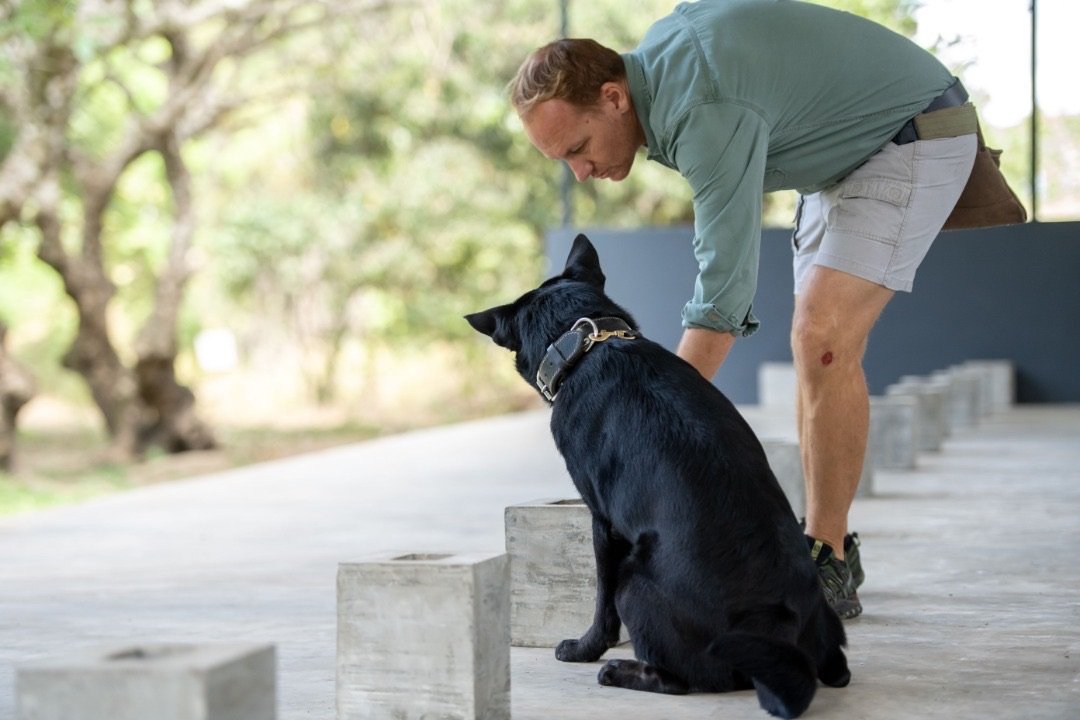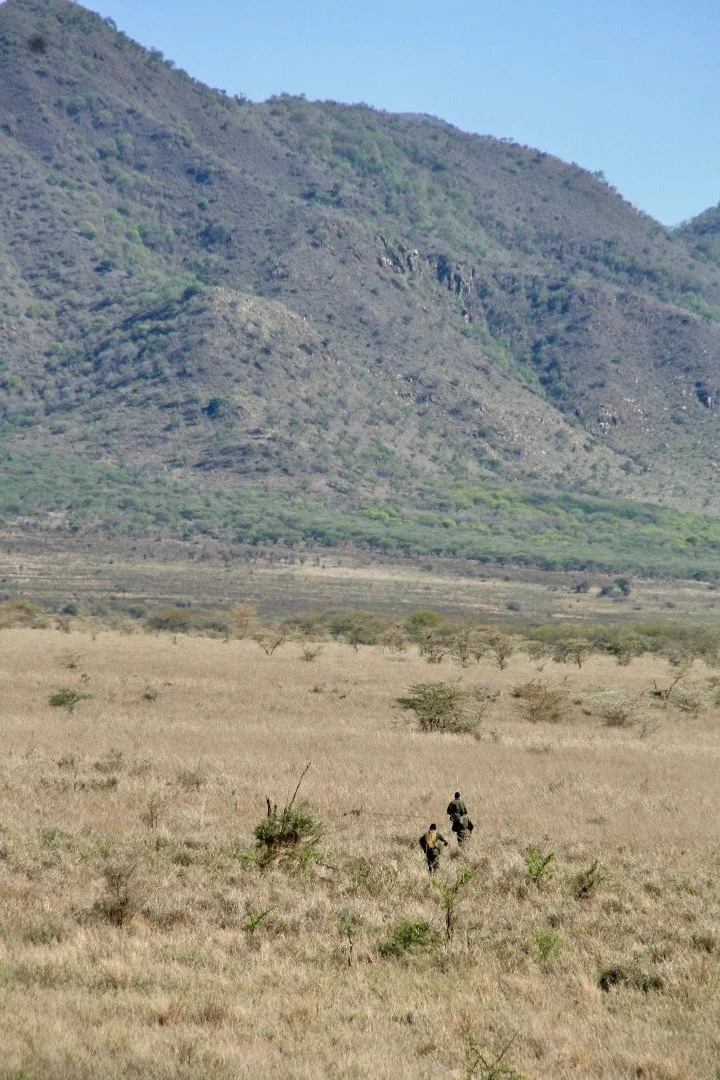Guardians of the Wild: The Ongoing Impact of Kuru the Conservation Dog
Kuru the Conservation Dog deploys trained dogs to protect Africa’s wildlife by reducing poaching, building partnerships with governments, and safeguarding endangered species. This update highlights our work and impact in 2024.
DECEMBER 2024
This briefing provides an update on the ongoing work of the Kuru Conservation Dog Programme. Despite facing significant financial challenges this year, we are eagerly awaiting the approval of our US 501(c)(3) status, which will enable more US donors to contribute to our efforts. In the meantime, we have been fortunate to receive support from a few generous donors, including direct donations to our Tanzanian account, assistance from the Honeyguide Foundation, and contributions from visiting tourists from A&K, Nomad, and Royal African Safaris. To help keep things going, Will has also taken on contracts with other NGOs, supporting detection dog teams in Ethiopia and helping to establish units in Northern Mozambique. Thanks to this combination of support and efforts, we have continued protecting key wildlife areas and training new detection dogs for conservation dog units. We’re also expanding our partnerships across Africa, with collaborations in Kenya, Mozambique, and Botswana. The individual dogs themselves have played a major role in the success of our work, demonstrating how a few well-trained dogs can protect vast landscapes and help save endangered species from poaching.
WORKING CLOSELY WITH GOVERNMENTS
One of the most rewarding aspects of our work has been the strong relationships we’ve built with governments across Africa. Governments appreciate our approach because we are easy to work with, respectful, and focused on helping rather than imposing a model that mirrors colonial-era conservation efforts. We recognise that governments face enormous challenges and often have limited resources, but many within those systems truly care about protecting wildlife and preserving their natural heritage. Our role is to offer support, work alongside them, and provide solutions that address their specific needs—never to judge.
This collaborative and respectful approach is central to how we operate, and it’s why governments continue to request our assistance in protecting their wildlife. We have seen firsthand how effective conservation partnerships can be when both sides are committed to a shared goal.
PROTECTING THE MANYARA LANDSCAPE: A DECADE OF SUCCESS WITH KURU DOGS
For over a decade, conservation dogs have been at the forefront of efforts to protect Manyara, playing a key role in safeguarding both the landscape and its wildlife. Before the canine unit was first introduced, 16 elephants were poached in the landscape in a single year. However, with the arrival of these well-trained, highly effective dogs, everything changed.
These dogs, capable of tracking poachers across vast distances, became a powerful deterrent. In their first year of service, only one elephant was lost, and in the years that followed, no further elephants were poached. The reputation of these dogs as swift trackers spread quickly, creating a secure environment for the wildlife on the ranch.
A SMALL UNIT WITH A BIG IMPACT
The success at Manyara Ranch highlights how a small, well-managed team can make an enormous difference. A few highly trained dogs, working in close coordination with dedicated handlers, have been able to protect vast landscapes simply through their presence. This approach has proven to be one of the most effective conservation tools available today, demonstrating that significant impact can be achieved with modest resources.
However, when the dogs were relocated to the Kuru dog school three months ago due to local political challenges, poaching sadly resumed. Just last month, an elephant was killed—the first in many years. In response, the government has requested that the dogs return to the Makuyuni area, recognising their vital role in maintaining security and deterring poaching.
EXPANDING OUR REACH: COLLABORATIONS WITH BIG LIFE, MOZAMBIQUE, AND BOTSWANA
Despite financial constraints, we’ve managed to expand the impact of conservation dogs across Africa, thanks to the generosity of a few key donors and support from organisations like the Honeyguide Foundation. In Kenya, we are working closely with Big Life Foundation, supporting their tracking dogs to combat poaching in critical areas. Our expertise and training are enhancing their unit’s effectiveness in protecting wildlife.
In Southern Africa, we have been approached by an NGO seeking to establish a dedicated dog programme for parks in Mozambique. Although there are options available in South Africa, the organisation specifically sought out Kuru due to our strong reputation for quality training and long-term success. We are excited to bring our experience to new areas of Mozambique, where this new programme will focus on safeguarding endangered species in key conservation areas.
Furthermore, we are in discussions with the Department of Wildlife and National Parks (DWNP) in Botswana to help establish the first DWNP tracking dog unit in the Okavango Delta. Supported by donor funding, this unit would represent a major step forward in protecting one of Africa’s most significant wildlife habitats. We are looking forward to supporting this important initiative.
REPLACING OLDER DOGS AND TRAINING NEW RECRUITS FOR TAWA DETECTION UNITS
In Tanzania, we are also planning to replace some of the older dogs currently working in TAWA detection units, particularly those stationed at airports. These older dogs will be replaced with younger recruits who will undergo intensive training to ensure they can effectively detect illegal wildlife products. This initiative is vital to maintaining the long-term efficiency of the units and securing the future of the project. By bringing in fresh recruits and equipping them with the skills they need, we will continue to improve the effectiveness of these units.
LAND PROTECTION ACROSS TANZANIA
Kuru-trained dogs continue to play a critical role in protecting vital landscapes across Tanzania, including:
• Serengeti National Park: 14,750 square kilometres (3.64 million acres)
• Mkomazi National Park: 3,245 square kilometres (802,000 acres)
• The Manyara Landscape: Over 8,000 square kilometres (1.98 million acres)
Through their ability to track poachers, remove snares, and serve as a strong deterrent to illegal activities, our dogs are ensuring the protection of these vast ecosystems and helping secure the future of endangered species. Their work in detecting and eliminating snares is particularly important in mitigating the threats faced by wildlife in these regions.
THE ROLE OF THE KURU DOG SCHOOL IN HEALTH, RECOVERY, AND KNOWLEDGE SHARING
Our dog school is not just a training facility; it is also a centre for ensuring the health and well-being of dogs throughout their working lives. Recently, we had two dogs fall seriously ill—one with an infection and another with trypanosomiasis (tryps). Thanks to the expertise, care, and well-established systems at the school, both dogs made a full recovery. Without such swift and professional care, the outcome could have been very different.
Beyond caring for our own dogs, we share our knowledge and experience with partners, helping them replicate our successes in their own dog programs. This ‘drop-in institutional knowledge’ strengthens conservation efforts more broadly, ensuring that our work continues to contribute to global conservation goals
The Kuru Conservation Dog Programme continues to demonstrate that a small team of well-trained dogs can make an extraordinary impact on wildlife conservation.
The success at Manyara Ranch and in the Serengeti are just two examples of how our dogs are helping to protect vast landscapes and ensure the survival of endangered species. As we expand our partnerships in Kenya, Mozambique, and Botswana, we anticipate even greater achievements ahead.
We remain deeply grateful for the support that allows us to continue this vital work, and we look forward to further expanding our efforts in the months and years to come.
The Kuru Team
If you'd like to support our work, here are a few ways to contribute.
For tax-deductible donations, we’ve partnered with Conservancy Guardians and the Royal African Foundation, who will direct your donations to Kuru and provide you with a tax receipt.
For USA donations, visit Royal African Foundation
For USA and UK donations, visit Conservancy Guardians
Both organisations share Kuru’s ethos, focusing on minimising overhead costs and ensuring funds go straight to where they’re needed most — on the ground.
If you’re not worried about tax deductibility or are donating from outside UK and USA, simply click here.





